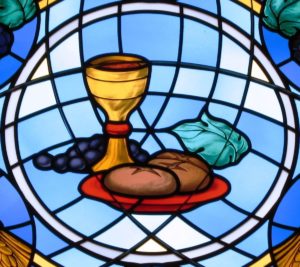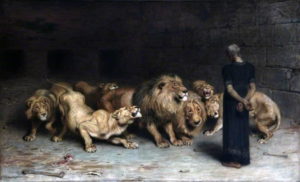
Todays Reading : Isaiah 52
The two elements that I think about during Easter are the bread and wine. Two items that were the reminder of the Passover feast have become the representation of Christ’s new covenant with us. But the choices of these elements werevery intentional and purposeful. Christ chose these to give us a true representation of the sacrifice and process that would be necessary for our salvation.
During the traditional Paschal Feast, a lamb has to be sacrificed and the blood placed on the doorpost of the family to show that there had been proper sacrifice to atone for the sins of the family. The process of sacrificing a lamb begins with the lamb being brought into the house of the family. The lamb is brought into the house four days before the sacrifice. This originally was to emphasize the meaning of the sacrifice to the Egyptians, but then it became a symbol of the closeness that you had to be to the sacrifice. The lamb had an intimate bond with the family and you knew the cost of the life given for you. The lamb was taken care of and not harmed before the sacrifice. Jesus was familiar with this custom as he was practicing his faith; but, he is revealing a new type of intimacy and price for sacrifice.
The elements that he intentionally uses are common among the people and they also have strong meanings. Bread has been for several centuries the sign of health and food. Many times the people were so hungry that they only had a small piece of bread to eat and sometimes it was not available daily. But Jesus had a different view of bread. The seed of the wheat, first, has to be buried before it sprouts new life. Then once the wheat has grown, it has to be harvested and threshed. The outer coating of the seed has to be broken to allow the inside of the seed to be use for nourishment. Next the seed has to be crushed and grounded into a powder or flour. Next the flour has to be worked until it is suitable for the loaf. The process that transforms the seed into the bread, completely changes the form and the nature of the wheat.
The next element that he uses for the new covenant is the wine. Wine has for ages been the vehicle for celebrations, healing and ceremonies. From ancient times to the modern times, wine was used to purify water in order to make it potable. But the process of making wine is a very intricate process. The vinedresser finds the correct fruit and then properly harvests the grapes. Then the grapes are placed in a wine vat and pressed with extreme hard labor that crushes the skin and the essence of the grape. The result is pulp and juice. Then the juice and the pulp are stored for a time until the correct amount of fermentation has occurred and then the wine is ready to consume.
With the understanding of these elements it is easy to understand the verse of today: Isaiah 52:13-15
Behold, my servant shall act wisely;[b]
he shall be high and lifted up,
and shall be exalted.
14 As many were astonished at you—
his appearance was so marred, beyond human semblance,
and his form beyond that of the children of mankind—
15 so shall he sprinkle[c]many nations.
Kings shall shut their mouths because of him,
for that which has not been told them they see,
and that which they have not heard they understand.
Jesus was preparing us in the last supper for the transformation that was about to take place. He was showing us that these were the true representation of His body and what was going to happen to it. The process of his sacrifice was going to be unlike that of the traditional Paschal Lamb, he would have to endure a process that would change the physical, emotional and spiritual forms to produce something that was more power. He would not be recognized after the process. “As many were astonished at you— his appearance was so marred, beyond human semblance,and his form beyond that of the children of mankind.” This was the preparation to the eternal. This is one reason that the women who came to see him after the resurrection didn’t recognize him, because they saw the marred and crushed body of the Messiah before he was transformed. I am thankful for the sacrifice and the transformation of the body for my salvation.
Father,
Thank you for the awesome sacrifice and humility you endured to save us. Thank you for the redemption and the elements to remind us of the love, power and glory you have. Thank you for the remembrance of your victory over death and sin. Amen.


